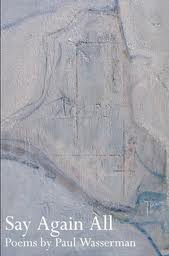Paul Wasserman served in Iraq as an Army NCO aircrewman. That terse job description might reflect a job as a helicopter crewchief or gunner, but reading between the lines of his poetry chapbook Say Again All suggests something more esoteric. It seems that Wasserman’s job entailed signal or intelligence support of special operation forces, carried out in planes circling high overhead rather than, say, Chinooks or Blackhawks ferrying ground warriors to and from combat. He brings to the task of portraying such service in poetry master’s degrees in philosophy and comparative literature. He now lives in New York City, part of the thriving veteran artists’ scene there.
Befitting Wasserman’s refined education and dark-side operational experience, Say Again All does not describe his war experience literally or sensationally. Various poems allude high-mindedly to Socrates, Homer, and NYC poetry giant Delmore Schwartz, though pop culture icons such as The Clash and Charles Bukowski are also name-checked. The closest Wasserman gets to a straightforward evocation of his deployment comes in the clever “Fifteen Months, Twenty-Two Days”:
1 war
6 states
5 countries
273 missions
1228.5 flight hours
30 rounds, unfired
15 days rest
4 medals
3 kills
1 case of friendly fire in the unit
2 cases of cowardice
1 case of cancer
52 steak nights
1 quasi-mutiny
5 divorces
1 pregnancy
1 unauthorized brewery
2 acts of bestiality, witnessed
34 paperbacks
2 overseas bars, right sleeve.
In most poems, however, Wasserman more subtly explores war and deployment as they profoundly order and reorder his experience of time and space. Say Again All‘s epigraph from Delmore Schwartz reveals that interest: “‘Only the past is immortal.” The theme is returned to in, among many other poems, “The Moon Here is Lower”:
And time is pooling in our eyes
The spill of it burning off noise
Everyone got issued a year in theater
We signed for it while our vaccinations dried
We crush it in our pockets
And let the tunnel-fill fall the length of us
Out over our boots
The way we lift the desert
Sifting an exit
Into the greenless rock and powder
A private act of distance
On daily trips to the airfield
Wasserman’s interest in language is given full play by the magical military lingo that enchants everyone, educated or not, who comes in contact with it. The title Say Again All is radio shorthand for “Repeat everything you just said, I didn’t get it the first time”–a good title for a book that won’t give away all its secrets in one read. In “Dead Wounded Missing,” Wasserman deconstructs the military’s use of the title phrase as a more-than-slightly-crude means of classifying casualties and lost or captured soldiers:
the first two words put together
might be a new way of exhaustion
useful, perhaps for the last time
one is ever exhausted
the growth of language
by precision
words to be used once.
Other poems display a keen eye for the surreal or absurdist moments of the war, not the least of them being the incongruity of being an aircrewman who holds master’s degrees in philosophy and literature. In “Artifacts,” Wasserman finds much company in the ranks of the over-educated. He describes a supply sergeant who studies “New Persian,” an MP who uses her leave to go trekking in Spain, and a pilot with a history degree who narrates the history of the Babylonian sites of antiquity over which they fly. “Artifacts” also references Yossarian, the anti-hero protagonist of Catch 22, the great black comedy of Army Air Force service in World War II. The allusion aptly refers to Wasserman’s own airborne perspective. Even total commitment to unit and mission, with life or death at stake, can’t efface the fact that the war is relentlessly experienced socially and personally as efforts to find connection and understanding in the midst of isolation and confusion.
Say Again All is available through Lulu Books, the online self-publishing venue.


What a great article. Peter, in this blog you’re doing something highly unusual, valuable, and even noble (In From Dawn to Decadence, Barzun cites the demise of noble as a sign that an age is over. But as Bellow noted with great approval in another context, there are always people that resist fashion and stand up for older virtues.) Bravo and congratulations. I’ve posted on my Facebook page about it to my handful of “friends.” Hopefully someone more connected than myself will spread the word. The best in the new year to you and your family.
Mark: Thanks for the love and the publicity–I’ll take all I can get of each. Not so sure how nobility coincides with craving for attention, though, but I’ll settle for unusual and valuable.
Bellow said it all best, first, didn’t he?
Happy New Year to you and all the Cohens, too!
-Peter